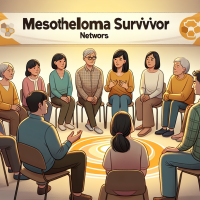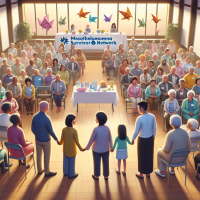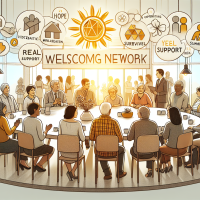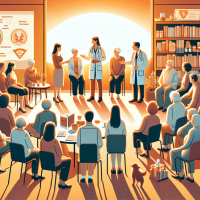Mesothelioma Survivor Network Events & Compassionate Support
Hello, I’m a registered nurse with over 10 years of experience in oncology, and I truly understand the emotional and practical challenges you face as you navigate the mesothelioma journey. Today, I invite you to join me in exploring mesothelioma survivor network events – gatherings designed to offer hope, practical guidance, and a shared sense of community. Together, we will dive into what these events entail, the benefits they provide, and how they serve as a powerful support system on your path to healing.
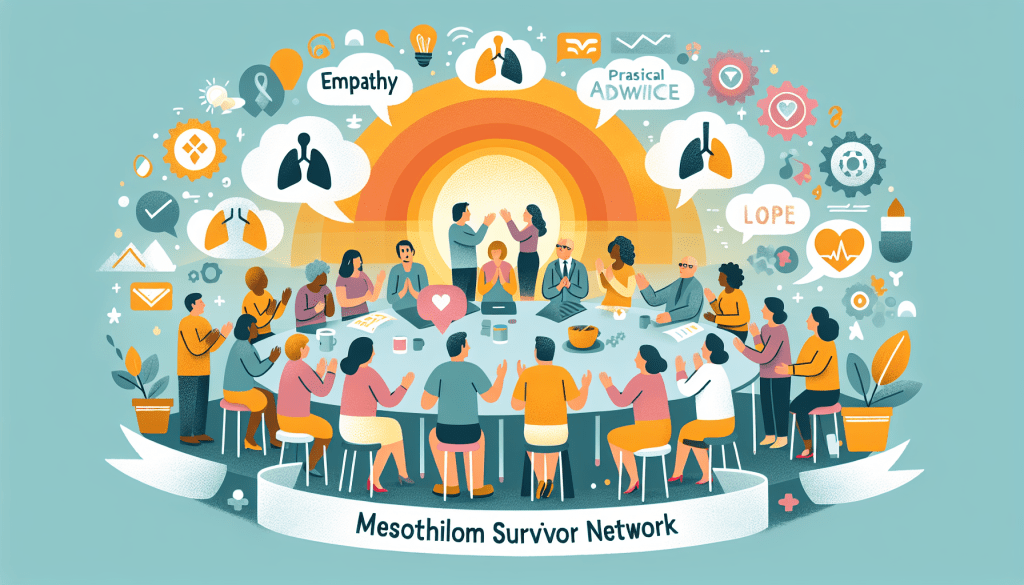
Understanding Mesothelioma and the Importance of Support
Mesothelioma is not just a medical condition; it affects every aspect of life, emotionally, physically, and socially. I have seen firsthand the strength that comes from connecting with others who understand your struggle. Whether you are a patient, a family member, or a caregiver, finding a supportive community can make a profound difference in managing both the illness and the emotional toll it takes.
What Are Mesothelioma Survivor Network Events?
Mesothelioma survivor network events are gatherings that not only focus on raising awareness about mesothelioma but also emphasize the importance of emotional and practical support. These events range from local meet-ups and support groups to large-scale conferences and fundraising events.
Examples include:
- Mesothelioma Support Groups: Intimate meetings where survivors, patients, and families share their experiences and coping strategies.
- Awareness Events & Conferences: National and international events like the International Symposium on Malignant Mesothelioma and Mesothelioma Awareness Day.
- Fundraising and Community Drives: Events such as Miles for Meso, which help raise funds and awareness simultaneously.
Key Components of a Mesothelioma Event
As I reflect on the events I’ve attended and recommended, here are key aspects that make these events invaluable:
- Emotional and Practical Support: Opportunities to learn about managing symptoms, coping with treatments, and connecting with experts.
- Expert Panels and Workshops: Sessions with oncologists, pulmonologists, and counselors offering the latest insights in treatment and care.
- Community and Shared Experiences: The chance to share one’s personal story, which can be incredibly healing and empowering.
Diagnosis, Staging, and Treatment Options
Understanding where you stand medically is an essential aspect of your journey. Let’s break down some crucial components:
Diagnosis and Biopsy Types
Mesothelioma diagnosis typically involves various biopsies, such as thoracoscopy or thoracentesis. These procedures allow doctors to determine the presence of mesothelioma cells and help in planning further treatment.
Mesothelioma Staging
The staging system for mesothelioma (Stages 1-4) gives a general idea of how far the cancer has spread. Here’s a simplified table to help you understand:
| Stage | Description |
|---|---|
| Stage 1 | Localized cancer, often treatable with surgery. |
| Stage 2 | Cancer has spread, but remains within a region. |
| Stage 3 | More extensive spread, requiring combination treatments. |
| Stage 4 | Advanced spread, treatment is focused on quality of life. |
This information is current as of May 2025, reflecting the latest treatment guidelines and diagnostic techniques.
Treatment Options
Treatment for mesothelioma can include surgery, chemotherapy, radiation, and innovative approaches like immunotherapy. Each treatment plan is tailored to the individual, and decisions are best made in close consultation with your healthcare team. I encourage you to learn more during specialized sessions at survivor events where experts explain how these treatments work in a compassionate and understandable way.
Emotional and Practical Support Strategies
Facing mesothelioma is an emotional journey. Throughout my career, I have learned that addressing the emotional impact is just as important as the medical care you receive. Here are some supportive strategies:
- Managing Anxiety and Fear: Join mindfulness sessions and therapeutic workshops to help reduce anxiety. Simple breathing exercises and guided meditation can be profoundly helpful.
- Seeking Mental Health Support: Professional counseling or therapy can be a safe space for expressing your fears and frustrations.
- Connecting with Others: Sharing personal experiences in a safe, understanding environment — such as at mesothelioma support groups — often brings unexpected strength and comfort.
Building a Support Network Through Survivor Events
When I attended my first mesothelioma survivor event, I realized that the power of shared experience can be transformative. These events are not just about treatments and diagnoses; they are about creating a family that stands together in hope and resilience. Here are some ways these events enhance your support system:
- Networking Opportunities: Meet others who are experiencing similar challenges. This kind of peer support is invaluable during difficult times.
- Educational Workshops: Learn about the latest research, clinical trials, and practical ways to manage the condition daily.
- Emotional Healing: Engage in group therapy sessions, art therapy, and other creative outlets designed to help process your emotions.
Practical Tools for Empowerment and Self-Care
Throughout these events, I often share practical resources that I have found invaluable. Here are two tools you can start using immediately:
Printable Questions for Your Doctor
Having a list of questions in hand can empower you during consultations. Consider asking:
- What are the potential side effects of my treatment?
- How will we monitor the effectiveness of the treatment?
- What lifestyle changes can help improve my quality of life?
- Are there local support groups or resources that you recommend?
Mindfulness Exercises for Stress Reduction
Practice simple mindfulness exercises such as:
- Find a quiet space and focus on your breath for 5 minutes.
- Notice the sensations in your body and let go of tension with each exhale.
- Reflect on a positive memory or a thing you’re grateful for.
These exercises can be a calming ritual to help manage stress and provide a moment of peace.
A Personal Reflection: From My Heart to Yours
Words of Encouragement I’ve Found Helpful:
I know how overwhelming it can be to face a diagnosis like mesothelioma. In my years as an oncology nurse, I have witnessed not only the pain of this condition but also the incredible resilience of those who face it. You are more than your diagnosis, and each step you take toward support and understanding is a victory. Remember, you are not alone, and I am here with you on every part of this journey.
Next Steps & Resources
Please consider these next steps as you continue your journey:
- Consult with your healthcare team: Always discuss any new treatments or changes in your condition with your doctor.
- Engage with support networks: Whether through local events or online communities, connecting with others can be a lifeline.
- Stay informed: Follow updates from reputable sources like the National Cancer Institute, American Cancer Society, and Mesothelioma Applied Research Foundation.
My intention is to offer both compassionate care and practical resources. This website is supported transparently to provide comprehensive information and support at no cost to you. Any commercial service mentioned, such as legal or financial guidance, is offered solely as an optional resource after you have explored the wealth of supportive information available here.
Final Thoughts
In closing, mesothelioma survivor network events are more than just informational gatherings; they represent hope, community, and an unwavering commitment to emotional and practical support. As someone who has dedicated my career to caring for patients like you, I encourage you to consider attending an event, connecting with a support group, or simply reaching out to someone who understands your journey.
Please remember that while this guidance is shared with heartfelt compassion and professional experience, it is always important to consult with healthcare professionals for personalized advice and treatment decisions.
Thank you for taking the time to read this comprehensive guide. I hope it brings you comfort, clarity, and the courage to move forward with hope.
Information on treatment guidelines current as of May 2025.
If you found this article helpful, I encourage you to read our other posts on Mesothelioma Treatment Options and Mesothelioma Support Resources for further insights.

